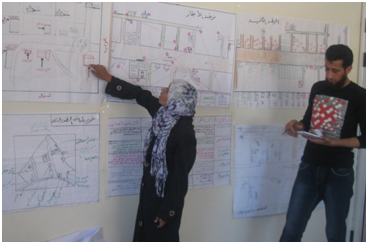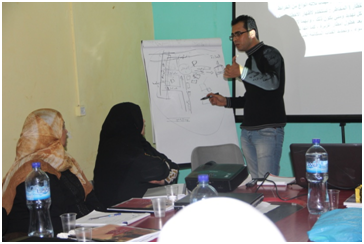Shaping the future: Our strategy for research and innovation in humanitarian response.

Shaping the future: Our strategy for research and innovation in humanitarian response.

A trainer of the vulnerability and Capacity Assessment (VCA) training that was conducted in May 2012 assists the participants in indentifying of their hazards, capacities, needs, and vulnerabilities. Location: Alburij Camp in the middle area of Gaza Strip.

Identifying of the hazards, vulnerabilities, needs, capacities:
During the training sessions, participating women focused on specific vulnerabilities and hazards, notably the militarily incursions. By exclusively focusing on military incursions, the participants unintentionally neglected other types of vulnerabilities, hazards, or even capacities. The trainer pointed out this narrow definition to the participants. In many cases, the participants did not know how to express certain hazards, capacities, needs, and vulnerabilities. While others continued to prioritize military incursions and were not interested in naming other vulnerabilities and hazards, although they affect their lives greatly.
Follow up during the information gathering:
During the training, women were provided toolkits and questionnaires to complete during their VCA assessment to be completed after the training. As some women had limited literacy, the field team followed up with participants while they collected information for their VCA assessments. Informal meetings were conducted with the groups to review and discuss data collection before presenting them formally in workshops. The informal meetings required both trainers and project team to understand the cultures of the participants. During the follow up process, many women said that they appreciated the trainer and project team participation, especially for the female trainers and staff. They said that they valued the friendships they developed as the team was open to the women’s personal stories. This highlights the fact that gender is important when constituting a field team.


 Please upgrade your browser
Please upgrade your browser
You are seeing this because you are using a browser that is not supported. The Elrha website is built using modern technology and standards. We recommend upgrading your browser with one of the following to properly view our website:
Windows MacPlease note that this is not an exhaustive list of browsers. We also do not intend to recommend a particular manufacturer's browser over another's; only to suggest upgrading to a browser version that is compliant with current standards to give you the best and most secure browsing experience.